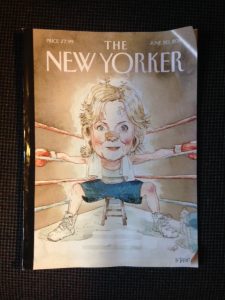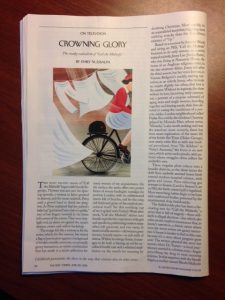I’m one of the legions of TV watchers addicted to Call The Midwife. It’s gritty and real. In spite of the historical context, it deals with issues important today, issues of women’s health and the monumental role of childbearing in women’s lives.

But even being a big fan, I was unaware that the series grew out of Jennifer Worth’s book, Call The Midwife: A Memoir of Birth, Joy, and Hard Times, until I read this week’s issue of The New Yorker.
Given my recent blog on First Women, I noticed the cover right away. In browsing the issue, I came across a two-page article by Emily Nussbaum: “Crowning Glory: The sneaky radicalism of Call the Midwife.”
Nussbaum wrote succinctly and powerfully about the TV series. She called the bloody, gory images set against a backdrop of tender, socially conscious humanism a “metonym” for the series. Every episode delves into “female reproductive experience. . . politicizing matters more often left personal, and vice versa.” For me, one of the most powerful things Nussbaum said was, “It treats invisible women—old women, poor women, homely mums—as rich wells of drama.” This is the sort of thing readers hunger for and writers should seek to exploit in their stories.
I haven’t read Jennifer Worth’s book, but I intend to. Having spawned this captivating series, it’s likely to be the best kind of memoir—a true story as gripping as well-written fiction.
I urge everyone to read the Nussbaum article and at least sample the PBS series. Reader or writer, see where it leads you!

